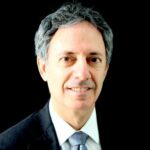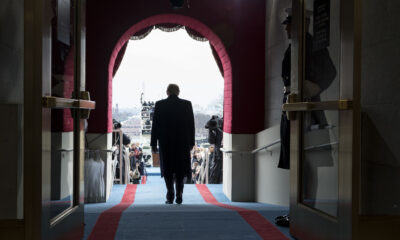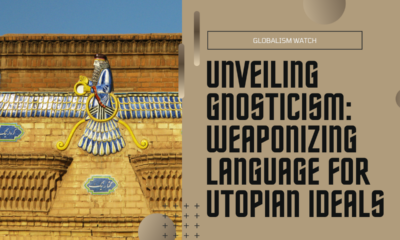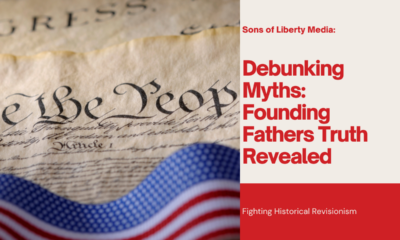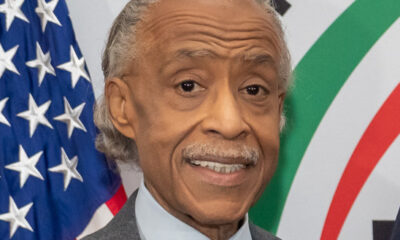Education
Harvard’s Crisis Stems From Debased Curriculum
The once-great Harvard University debased its curriculum, thus setting up its fall from grace. A former dean tells only half the story.

Last month, Harry Lewis published a Harvard Crimson column that squarely laid the blame on Harvard for the crisis that has engulfed the great university. Fifty years of experience on the banks of the Charles River inform Lewis’ severe judgment: He is a longtime Harvard computer science professor, a 1968 Harvard College graduate, and, from 1995 to 2003, he served as dean of Harvard College. Nevertheless, while illuminating Harvard’s damaging politicization over the last 20 years of its undergraduate curriculum – and despite his half century at Harvard – Lewis overlooks the full extent of the crisis.
In “Reaping What We Have Taught,” Lewis maintained that the surge of antisemitism on campus following Hamas’ perpetration of mass atrocities in Israel on Oct. 7 was not the fault of Claudine Gay, who resigned as Harvard’s president in early January. Nor, he asserted, had Harvard admitted antisemitic students or hired antisemitic faculty. The problem, rather, lies in Harvard’s curriculum: “Unapologetic antisemitism – whether the incidents are few or numerous – is a college phenomenon because of what we teach, and how our teachings are exploited by malign actors.”
Lewis performed a simple experiment. He typed into the Harvard online course catalog search box key words associated with fashionable progressive ideology. The word “decolonize,” he found, “is in the titles of seven courses and the descriptions of 18 more” – more than triple its appearance before 2000. The words “oppression” and “liberation” are each “in the descriptions of more than 80 courses,” while “‘Social justice’ is in over 100.” Lewis also searched for “white supremacy” and “Enlightenment” – these days, it is often said, the latter arises out of and perpetuates the former. He discovered that the terms’ appearances in the online course catalog run “neck and neck, both ahead of ‘scientific revolution’ but behind ‘intersectionality,’” which barely registered before 2000.
Although acknowledging his experiment’s limitations – “word frequency is an imperfect measure” – Lewis argued that the results reflect the Harvard faculty’s exploitation of the classroom to advance left-wing concepts and claims. The replacement of education by advocacy creates fertile soil for sowing hatred: “When complex social and political histories are oversimplified in our teachings as Manichaean struggles – between oppressed people and their oppressors, the powerless and the powerful, the just and the wicked – a veneer of academic respectability is applied to the ugly old stereotype of Jews as evil but deviously successful people.”
The malign consequences are not confined to Harvard: “Merchants of hate are repurposing these intellectual goods that universities are producing.”
To mitigate the damage, Lewis called on the university to reduce the “political bias in our faculty.” Affirmative action for conservative professors, he argued, would magnify the distortion by suggesting that left-wing classroom proselytizing should be balanced with right-wing proselytizing.
The better approach is for “individual faculty” to “diversify what they teach.” Since professors can’t be counted on to voluntarily undertake the necessary changes, “Committees and departments could enforce a standard that curricula exhibit intellectual diversity and a variety of agreed-upon topics and techniques.”
Such a proposal, Lewis acknowledged, is likely to meet stiff resistance from professors because they have grown accustomed “to teach whatever they wish to whomever they wish.” Keen to concentrate on their narrow scholarly interests and to promote their larger political visions, professors, observed Lewis, “favor the hip, current, and ‘relevant,’ over foundational learning – what instructors personally believe to the exclusion of what students should learn to participate knowledgeably in the world outside our gates.”
Consequently, he contended, “the current tenure system, now tired and manipulable” must undergo substantial reform. But that, Lewis recognized, will take decades.
In the short term, he emphasized, the university must avoid combating left-wing indoctrination with right-wing indoctrination. “The goal is not to give students a choice between courses reflecting different ideologies,” Lewis wrote. “Harvard should instead expect instructors to leave their politics at the classroom door and touch both sides of controversial questions, leaving students uncertain where their sympathies lie. Professors should have no more right to exclude from their teaching ideas with which they disagree than students should expect to be shielded from ideas they find disagreeable.”
That is well said. But as undergraduates, throughout graduate training, and during the acquisition and enjoyment of tenure, today’s professors have been rewarded by a system that at best turns a blind eye to, and at worst prizes the use of, the classroom and scholarship to accomplish political ends. After decades of socialization by warped norms and distorted incentives, what will prompt professors to change their ways?
Lewis appealed to virtue. “All that is required,” he advised, “is for faculty to exhibit some humility about the limits of their own wisdom and embrace the formula for educational improvement voiced by Le Baron R. Briggs, a Harvard dean, more than a century ago: ‘increased stress on offering what should be taught rather than what the teachers wish to teach.’” Many faculty, however, firmly believe that what they wish to teach is what should be taught.
Lucid as is Lewis’ analysis, self-serving professors and a dysfunctional curriculum are not the whole story about the outbreak of “unapologetic antisemitism” at Harvard.
Claudine Gay had been dean of the faculty of arts and sciences for five years preceding her six-month presidency. As Harvard’s most prominent and powerful advocate of the divisive Diversity, Equity, and Inclusion industry – which allocates benefits and burdens based on race – she must share blame for the volatile atmosphere that had developed on campus, and which exploded following Hamas’ Oct. 7 attacks.
Moreover, ignorance and youthful exuberance alone cannot explain students’ appalling online statement posted on the very day of Hamas’ cross-border savagery. Drafted by the Harvard Undergraduate Palestine Solidarity Committee and co-signed by 33 other student groups, the document declared “the Israeli regime entirely responsible for all unfolding violence.”
In addition, in an extended analysis on “X” in late January,
former Harvard president and now professor Larry Summers asserted that he “lost confidence in the determination and ability of the Harvard Corporation and Harvard leadership to maintain Harvard as a place where Jews and Israelis can flourish.” The straw that broke the camel’s back was the appointment of Derek Penslar, professor of Jewish history and director of Harvard’s Center for Jewish Studies, to co-chair a new antisemitism task force – Harvard’s second since Oct. 7, 2023. Although not doubting that Penslar was free of even “a trace of personal anti-Semitism,” Summer wrote that “Prof Penslar has publicly minimized Harvard’s anti-Semitism problem, rejected the definition used by the U.S. government in recent years of anti-Semitism as too broad, invoked the need for the concept of settler colonialism in analyzing Israel, referred to Israel as an apartheid state and more.” The university, Summers concluded, is marked by “a double standard between anti-Semitism and other forms of prejudice.”
Notwithstanding these contributory causes to the post-Oct. 7 outburst of antisemitism on campus, the curriculum is, even more than Lewis realizes, a cause of Harvard’s turmoil.
For almost as long as Lewis has been at Harvard, the university placed the undergraduate curriculum in the service of professors’ scholarly and political priorities. In the 1970s, Harvard abandoned a core curriculum grounded in Western civilization’s major ideas, defining events, and characteristic institutions in favor of one that featured categories of, or methods of acquiring, knowledge. Within divisions such as “Moral Reasoning,” the revised core offered a wide variety of elective courses through which students could fulfill distribution requirements. Not incidentally, the new core allowed faculty to teach their specialties without providing students an introduction to the basics.
In 2019, Harvard again revised its core. “The Program in General Education,” Harvard’s website proclaims, “is the cornerstone of the Harvard curriculum.” Unfortunately, the new cornerstone reinforces the principal defects of the one it replaces.
Harvard students must take one course in each of four categories: aesthetics and culture; ethics and civics; histories, societies, individuals; and science and technology in society. But professors are unlikely to inform students that they lack the necessary preparation to put the claims and judgments they are learning in historical, moral, and political context or apply them responsibly to current circumstances.
Consider the Ethics & Civics category. The 2024 spring semester offerings feature such options as “Ethics of Climate Change,”; “Evolving Morality: From Primordial Soup to Superintelligent Machines,” and “Ignorance, Lies, Hogwash, and Humbug” (which deals with fake news and other forms of deceit that mark “the post-truth era”). With one of these courses, students can check the ethics and civics requirement at Harvard without ever studying Western civilization’s biblical and classical foundations, the synthesis of faith and reason in the Muslim, Christian, and Jewish Middle Ages, the modern tradition of freedom’s emergence in the 17th and 18th centuries, and, not least, America’s founding principles and constitutional traditions.
The post-Oct. 7 educational crisis at Harvard, entwined with antisemitism, has been several decades in the making. Effective reform must replace the current curriculum, which advances professors’ interests in niche scholarship and partisan politics, with one that serves students’ interests in acquiring an organized introduction to the humanities, social sciences, and natural sciences and in undertaking a reasoned exploration of the United States, the West, and the world.
This article was originally published by RealClearPolitics and made available via RealClearWire.
Peter Berkowitz is the Tad and Dianne Taube senior fellow at the Hoover Institution, Stanford University. From 2019 to 2021, he served as director of the Policy Planning Staff at the U.S. State Department.
-

 Executive4 days ago
Executive4 days agoSecret Service chief gets no solace
-

 Executive3 days ago
Executive3 days agoWaste of the Day: Louisville Taxpayers Pay Nearly $600,000 For Empty Building’s Maintenance, Security
-

 Guest Columns4 days ago
Guest Columns4 days agoFear Itself: Democrats’ Favorite Strategy Caused Their Current Chaos
-

 Executive3 days ago
Executive3 days agoWhere is Joe Biden – or Jill?
-

 Executive1 day ago
Executive1 day agoWaste of the Day: Throwback Thursday: Cities Used Crime Prevention Funds on Soccer Games, Paper Shredding
-

 Executive2 days ago
Executive2 days agoFacile and politically motivated suggestions
-

 Civilization5 days ago
Civilization5 days agoBuild Iron Dome in the United States To Prepare for Israel’s Worst Day
-
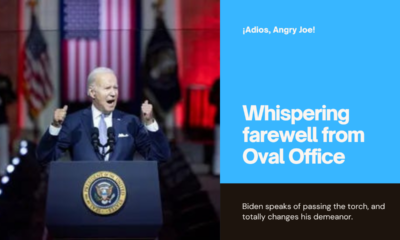
 Executive1 day ago
Executive1 day agoBiden makes farewell whisper


